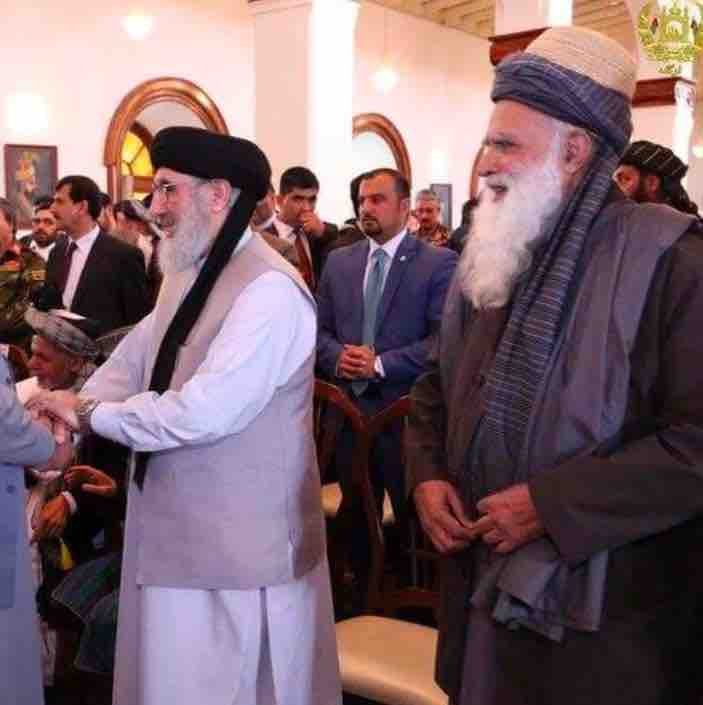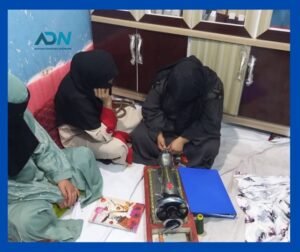Taliban’s Expulsion of Former Jihadi Leader Sparks Outcry and Criticism

Gulbuddin Hekmatyar, shown left, a prominent figure among Afghan jihadi leaders in the nation's turbulent history. Photo: @Private
By Ilhamuddin Afghan
In a recent turn of events, the Taliban’s Minister of Justice, Abdul Hakim Shara’ee, made headlines by ordering the expulsion of former jihadi leader Gulbuddin Hekmatyar from his designated residence. This move has ignited widespread condemnation and raised concerns about the Taliban’s approach to former political figures.
Gulbuddin Hekmatyar, a significant figure in Afghan politics, found himself stripped of privileges granted by the previous government, including the closure of his private university and restrictions on public appearances and publications. Minister Shara’ee justified the expulsion by stating that Hekmatyar had acquiesced to the system and disbanded his political party, Hizb-e-Islami.
However, the decision has faced sharp criticism from various quarters, with Hekmatyar’s son, Habibur Rahman Hekmatyar, slamming it as a violation of laws and principles. He accused the Taliban of targeting Hizb-e-Islami rather than addressing genuine concerns.
“It is evident from his statement that the primary concern lies with Hizb-e-Islami, rather than the six acres of vacant land previously allocated to the Ministry of Defense and subsequently transferred to Hizb-e-Islami under the signatures of the former President and Minister of Defense,” he wrote on X (formerly known as Twitter).
Social media platforms have been abuzz with dissent, with many former jihadi leaders and ordinary citizens expressing their disapproval of the Taliban’s actions. Mumtaz Jahangir, a vocal user, criticized what he perceived as covert attempts to pressure Hizb-e-Islami through foreign channels.
“Thanks to Hizb-e-Islami, Mullahs (clerics) became involved in politics, gained popularity in Afghan society, and even today they hold positions of power. However, unfortunately, some covert clerics are attempting to exert pressure and issue threats against Hizb-e-Islami through foreign channels,” Jahangir posted on his social media page.
Dr. Farooq Azam, another former jihadi leader and current advisor to the Ministry of Electricity in the Taliban government, defended Hekmatyar’s legacy and called for his respect. Azam emphasized Hekmatyar’s contribution to Afghanistan’s history and urged recognition of his service.
“These days, there are numerous verbal attacks on Mr. Hekmatyar, even from some of his own family members. However, it is undeniable that Mr. Hekmatyar has been an integral part of our proud history, steadfastly defending Afghanistan’s integrity against foreign aggression for the past half-century. He deserves respect, as living nations honor their living leaders,” wrote Azam on his Facebook page.
While Mr. Azam did not explicitly mention the Taliban in his speech, he alluded to remarks made by the Minister of Justice of the Taliban, who criticized the leader of Hizb-e-Islami using inappropriate language.
However, Hekmatyar’s expulsion is just one facet of a broader pattern of authoritarian behavior exhibited by the Taliban, with reports emerging of arbitrary arrests and seizures of former political leaders’ homes. These actions underscore a troubling trend of dissent suppression and disregard for democratic principles.
The international community has voiced deep concern over the Taliban’s treatment of former political leaders, highlighting its implications for Afghanistan’s stability and democratic progress. Calls for respect for human rights and democratic principles have intensified, urging the Taliban to engage in constructive dialogue with all stakeholders.
As Afghanistan navigates these turbulent waters, the importance of transparency, accountability, and respect for fundamental freedoms cannot be overstated. Hekmatyar’s expulsion serves as a stark reminder of the fragility of Afghanistan’s political landscape and the urgent need for inclusive and equitable governance.
“The Taliban show no respect for Afghans, especially the leaders, or their rights. They treat Afghanistan like an occupied zone that they rule, where nobody can speak against them,” remarked a former Jehadi commander now residing in Germany.
Ilhamuddin Afghan is a university professor based in Afghanistan.
Note: The contents of the article are of sole responsibility of the author. Afghan Diaspora Network will not be responsible for any inaccurate or incorrect statement in the articles.






